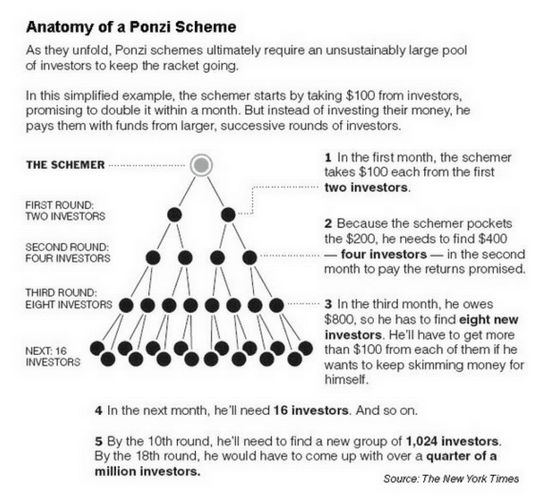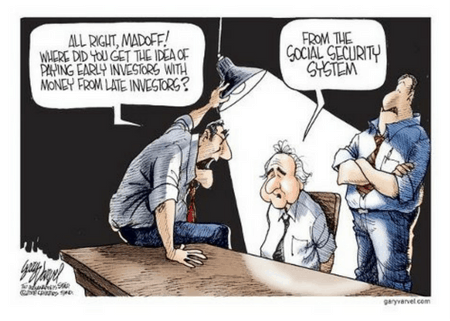A Ponzi scheme is investment fraud. The perpetrator takes people’s money under the pretense of investing it with a promise of making an above average return on the investment.
A Ponzi Scheme Definition.
However, the money is never invested. The bulk of the investor’s money is pocketed by the perpetrator. The perpetrator pays the first tier of investors with a fraction of the money taken from the second tier of investors. And the second tier of investors are paid a fraction of the money taken from the third tier of investors, and on it goes until the scheme is discovered by authorities or collapses.
Click to DISCOVER a Proven Path to Financial Independence!
The difference between a Ponzi scheme and a pyramid scheme relates to how people are brought into the scam.
The terms Ponzi scheme and pyramid scheme are often thought to mean the same thing. Both are illegal, and both will result in losing money. Both a Ponzi scheme and a pyramid scheme pay first investors/members with the money from investors/members that enter the scheme later.
In a Ponzi scheme, investors give money to a central figure or firm. There is no true investment. A percentage of the money from late investors is paid to early investors creating the illusion of a return on investment. Generally speaking, a Ponzi scheme will present itself as an investment opportunity.
A pyramid scheme, on the other hand, requires each member to recruit more members who, in turn, recruit still more members. Often there is an incentive for members to buy the right to sell a specific product to make more money. Members then pay the person who recruited them for the license to sell the product and profits are shared up the line to higher level members. Pyramid schemes typically present themselves as Multi-level marketing organizations.
Why Ponzi Schemes Collapse
A Ponzi scheme can continue until it is either discovered by authorities or collapses.
Because there is no product and nothing of value is created in a Ponzi scheme, a consistent influx of new money from new investors is needed.
Mathematically, it is a certainty that a Ponzi scheme will eventually collapse. It cannot continue forever because, in time, it will become difficult to find new investors, and at some point, the old investors will want to withdraw their money from the program.
Meet Charles Ponzi
The scheme known as a Ponzi scheme has been around since the beginning of money, markets, and trading, but it acquired its name in the 1920s when Charles Ponzi speculated in postage stamps and promised investors a 90-day return of 50%, an unheard return on investment.
Initially, Ponzi did try to make his investment strategy in stamps work. When it failed, and investors continued to give him money, he abandoned the stamp investment strategy. Instead, he paid the earlier investors with a percentage of the money from investors who came later.
Word spread across the United States that Ponzi was indeed paying 50% interest on a 90-day investment. He was swamped with people giving him money and also drew the attention of authorities who quickly shut down his operation.
Click to DISCOVER a Proven Path to Financial Independence!
Bernie Madoff, Later Day Ponzi Master
Bernie Madoff is famous for perpetrating a $64.8 Billion Ponzi scheme. In 2009 Madoff pleaded guilty to securities fraud, trust fraud, mail fraud, money laundering, perjury, and theft. He was sentenced to 150 years in prison and fined $170 Billion.
Madoff’s fraud differed from the typical Ponzi scheme because most Ponzi schemes are founded on businesses that are not real. Bernie Madoff had an established brokerage firm. However, in his guilty plea, he admitted that he had not traded securities since the early 1990s. Instead of investing the money of his investors, in true Ponzi fashion, Madoff took money from late investors to pay early investors.
Ponzi Scheme Red Flags
The signs of a typical Ponzi scheme include;
-The promise of an unusually high return on investment with low risk.
-A level rate of return. The returns from real investments will rise and fall over time.
-Investments that are not officially registered.
-The people selling the investment are not licensed.
-Complex strategies that cannot be understood. Never invest in anything you don’t understand.
-No paperwork on investments or the paperwork is vague or misleading.
-Payments are not received as promised.
Report suspect Ponzi schemes to your local FBI office.
Have you experienced a Ponzi or Pyramid scheme? If you are a multi-level marketer, how does a true MLM differ from a pyramid scheme?





so then how do you tell a pyramid scheme from a true MLM?
Hi, Floyd!
In my view, there is very little difference between a pyramid scheme and an MLM. It might boil down to how good their defense lawyers are. MLM is a legal specialty.
According to the US FTC, the legal test as to whether an organization is a pyramid scheme or an MLM is based on a few core issues. A pyramid scheme will 1.) Promote very expensive products. 2.)Promote products mostly to their members. 3.) Force members to purchase expensive products before they can earn a commission on the products.
Amway was investigated as a pyramid scheme in the 1970s. It was determined that they were NOT a pyramid scheme because most of their revenue came from retail sales to people who were not members or distributors of the company. In the early 1970s, The Dare to Be Great organization was determined to be a pyramid scheme because it sold membership levels exclusively to members.
In my view, an online organization that sells membership levels to the tune of hundreds, thousands and tens of thousands of dollars exclusively to members and demands members purchase these levels before they can earn commissions for selling those levels is a pyramid scheme. There are many of these organizations online and they are destroying people’s lives.
I hope this helps. Thanks for stopping by,
Gary
I fell for a few of these scams when I was younger. These crooks running the scams should all be in jail, they are stealing from people who are desperate for money to begin with. glad there are legitimate programs out there though, the one you suggest “wealthy affiliate” sounds legit.
Hi, Kent!
Thanks for sharing your experience with Ponzi schemes. These scammers know exactly what they are doing. I suspect they are psychopaths with no empathy for others. I also think they get a thrill out of skirting the law. It’s probably like a gambler’s high.
There are a few legitimate programs available. The best one I’ve found is Wealthy Affiliate. It’s free to join, so you can check it out without risking a dime.
Thanks for stopping by,
Gary
Hi there Gary,
I had actually heard of Ponzi schemes before (really who has not) and actually got caught up in one but fortunately did not lose too much. Unfortunately, there are a lot of Ponzi operations going on in the internet these days.
One such way to avoid such Ponzi schemes is to check the registration date of the site – it is too new, like less than a year or two it could very well be a ponzi.
Hi, Derek Marshall!
Thanks for the tip about checking the registration date of a site to see if it’s a Ponzi scheme. I’m sure this will be helpful, but it won’t be absolute.
Thanks for stopping by,
Gary
Hi Gary,
Being a UConn alumnus one of the storied men’s basketball program’s heroes who made a miraculous shot in the 1990 NCAA tournament, Tate George about 4 – 5 years ago was convicted of pulling off a Ponzi scheme that involved former teammates and other “associates” of this individual. George now resides in a 10 x 12 ft. Federal jail cell, his home for the next decade or so.
I am familiar with the Bernie Madoff Ponzi scheme which was in the news so often back in around 2009 before he got sent off to jail. Tate George’s scheme was not near to the level of Madoff’s however both men are now where they deservedly belong.
I look at your diagram which explained exactly how these schemes are modeled. They so clearly are like pyramid schemes seen in scam businesses in which the person at the top benefits the most if it is successfully pulled off. And as you said because of the very nature of these schemes more often than not they fail miserably.
The greed of human beings, truly flawed animals always seeking to get something, (money being the most desired material thing) that they do not rightfully earn is why scams such as Ponzi schemes are seen in the world of business.
Jeff
Hi, Jeff!
Thanks for reminding me about Tate George’s real estate investing Ponzi scheme. He suckered people who should have known better. That just goes to show anyone can get drawn into these schemes. Tate George got 9 years, but he may not have to serve it all. Madoff will probably die in jail.
It’s interesting to me that neither Tate George or Madoff showed any remorse for the harm they caused others. Their lack of empathy for their victims suggests an underlying psychopathy and personality disorder.
Thanks for stopping by,
Gary
Thank you for explaining so clearly the difference between a Ponzi scheme and pyramid scheme. I now understand that a Ponzi scheme is mostly an investment scheme with a central figure doing all of the recruiting. I like how you diagram it as a circle with “The Schemer” in the middle of the circle.
A pyramid scheme, as I understand from your thorough reply, is a business scheme where each level of members recruits the level below it. “The Schemer” is at the top of the pyramid.
Thank you.
Hi, John!
Yes, that’s right. Both are scams and will cost the honest person money. And both are becoming more common online.
Thanks for stopping by,
Gary
Thank you for your take on Ponzi schemes, I am enlightened on the origin of the scam Ponzi scheme. Actually, I have heard the word together with the word ” Pyramid Scheme. You left that out in your article. Can you kindly help with the major different between Ponzi and Pyramid Scheme? I am just curious!
Hi, John!
Thank you for your question.
There are several differences between a Ponzi scheme and a pyramid scheme, but the most obvious difference is how they recruit people into the scam. With a Ponzi scheme the originator of the scheme, let’s call him “The Schemer,” recruits everyone into the scheme. Usually, in a Ponzi scheme “The Schemer” will pretend to be an investor who recruits others into the scheme under the guise of making a lot of money fast. In a diagram, a Ponzi scheme would look like a circle of people with “The Schemer” in the middle. “The Schemer” recruits everyone. Money is made when the recruits give “The Schemer” money for an investment that does not exist.
A pyramid scheme is different. In a pyramid scheme, “The Schemer” is at the top of a pyramid-shaped organization. “The Schemer” recruits the first few recruits. The first recruits then recruit more recruits, forming a second level. The second level of recruits then recruit a third level, etc. etc. The base of the pyramid organization continues to grow wider. A pure pyramid scheme does not have a product. However, most pyramid schemes DO offer some sort of product to conceal the true nature of the scheme.
Both the Ponzi scheme and the pyramid scheme are dependent on recruiting. In the Ponzi scheme, “The Schemer” does all of the recruiting. With a pyramid scheme, each level recruits the level below it.
If you join a Ponzi scheme you will not be expected to recruit anyone. If you join a pyramid scheme you will be encouraged through bonuses and incentives to recruit others. Most pyramid schemes conceal their dependency on recruitment until you are financially committed to their scheme. At that time you can quit and lose your money or stay in the scheme and recruit others.
The Ponzi scheme is a circle with “The Schemer” in the middle. The pyramid scheme is a pyramid with “The Schemer” at the top.
Thanks for stopping by,
Gary
Wow, great explanation of the scheme. It’s a shame that people actually do this. That is why buyer beware is so important. I enjoyed getting the info on Ponzi. I always wondered where the name came from. You are right to promote a legitimate business building platform as you have.
Hi, Dennis!
Both Ponzi schemes and their close relation, the pyramid scheme, are becoming more wide spread on the internet. Many of these scams are based in countries that do not or can not regulate them. Also, it can be a matter of splitting legal hairs and interpretation to determine if a business is indeed a Ponzi scheme.
As a general rule, if it seems too good to be true, it probably is and if you can’t understand the details of a so-called business opportunity, it’s probably a scam.
Thanks for stopping by,
Gary